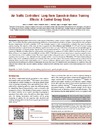Identificador persistente para citar o vincular este elemento:
https://accedacris.ulpgc.es/jspui/handle/10553/21067
| Título: | Air traffic controllers' long-term speech-in-noise training effects: A control group study | Autores/as: | Pérez Zaballos, M.T. Pérez Plasencia, Daniel Zaballos González, María Luisa Ramos de Miguel, Ángel Ramos Macías, Ángel |
Clasificación UNESCO: | 32 Ciencias médicas 2201 Acústica 220105 Ruido 330702 Electroacústica |
Palabras clave: | Air traffic controllers Auditory training Psychoacoustics Speech perception in noise |
Fecha de publicación: | 2016 | Editor/a: | 1463-1741 | Publicación seriada: | Noise and Health | Resumen: | Introduction:Speech perception in noise relies on the capacity of the auditory system to process complex sounds using sensory and cognitiveskills. The possibility that these can be trained during adulthood is of special interest in auditory disorders, where speech in noise perceptionbecomes compromised. Air traffic controllers (ATC) are constantly exposed to radio communication, a situation that seems to produceauditory learning. The objective of this study has been to quantify this effect.Subjects and Methods:19 ATC and 19 normal hearingindividuals underwent a speech in noise test with three signal to noise ratios: 5, 0 and−5 dB. Noise and speech were presented through twodifferent loudspeakers in azimuth position. Speech tokes were presented at 65 dB SPL, while white noise files were at 60, 65 and 70 dBrespectively.Results:Air traffic controllers outperform the control group in all conditions [P<0.05 in ANOVA and Mann-Whitney U tests].Group differences were largest in the most difficult condition, SNR=−5 dB. However, no correlation between experience and performancewere found for any of the conditions tested. The reason might be that ceiling performance is achieved much faster than the minimumexperience time recorded, 5 years, although intrinsic cognitive abilities cannot be disregarded.Discussion:ATC demonstrated enhancedability to hear speech in challenging listening environments. This study provides evidence that long-term auditory training is indeed useful inachieving better speech-in-noise understanding even in adverse conditions, although good cognitive qualities are likely to be a basicrequirement for this training to be effective.Conclusion:Our results show that ATC outperform the control group in all conditions. Thus, thisstudy provides evidence that long-term auditory training is indeed useful in achieving better speech-in-noise understanding even in adverseconditions. | URI: | https://accedacris.ulpgc.es/handle/10553/21067 | ISSN: | 1463-1741 | DOI: | 10.4103/1463-1741.195804 | Fuente: | Noise and Health [ISSN 1463-1741], vol.18 (85), p.376-381 | Derechos: | by-nc-nd |
| Colección: | Artículos |
Citas SCOPUSTM
4
actualizado el 08-jun-2025
Citas de WEB OF SCIENCETM
Citations
3
actualizado el 01-feb-2026
Visitas
80
actualizado el 27-jul-2024
Descargas
37
actualizado el 27-jul-2024
Google ScholarTM
Verifica
Altmetric
Comparte
Exporta metadatos
Los elementos en ULPGC accedaCRIS están protegidos por derechos de autor con todos los derechos reservados, a menos que se indique lo contrario.
